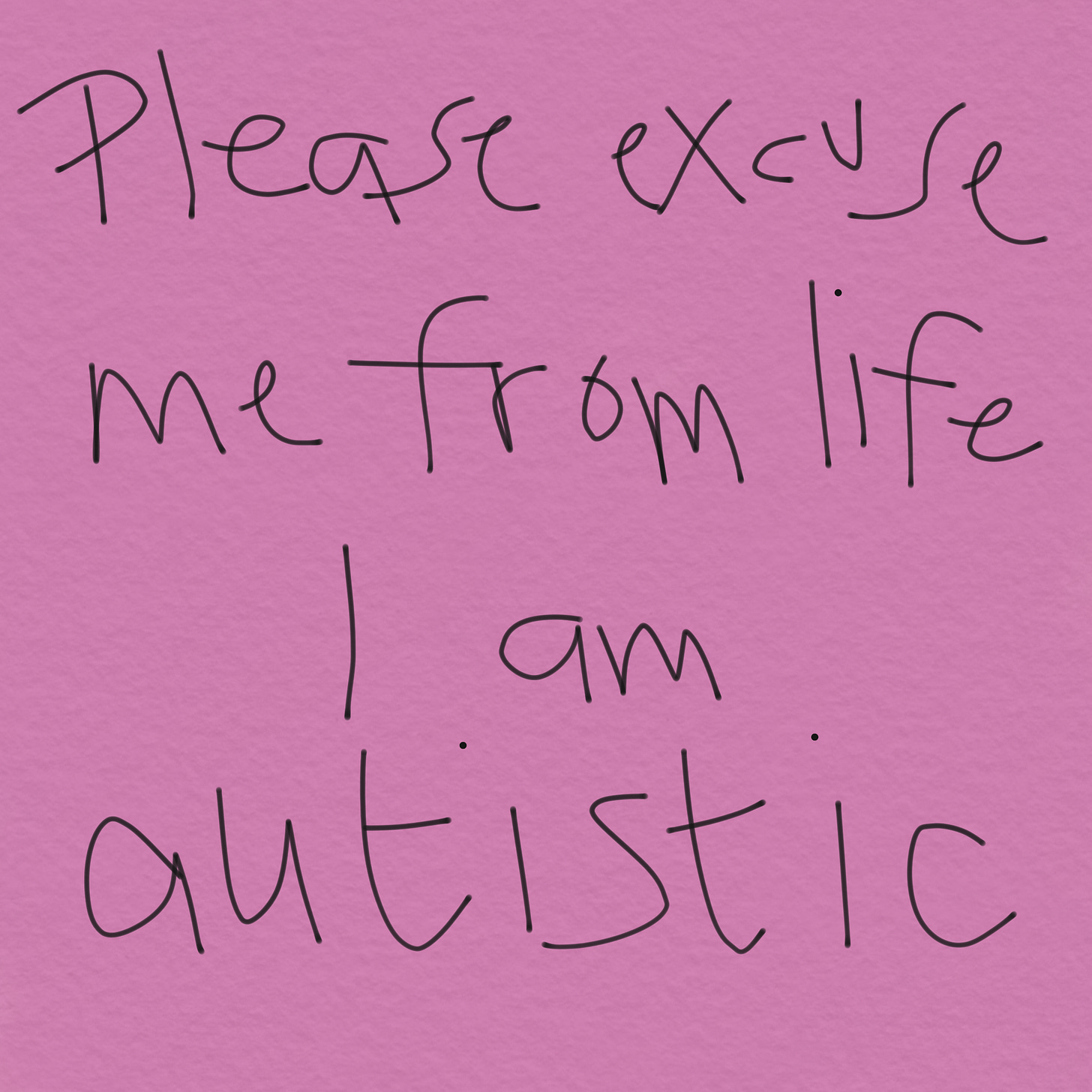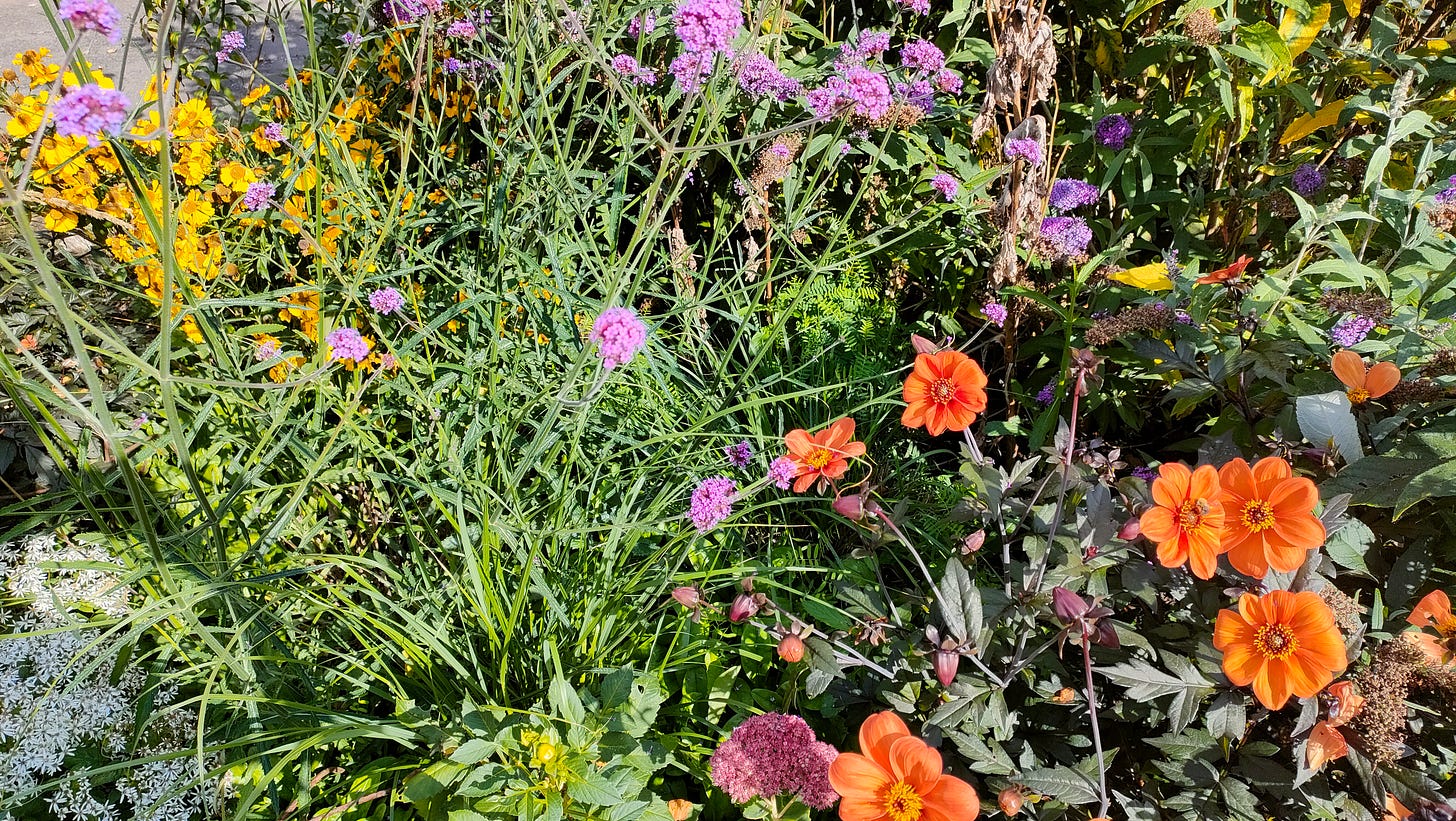Does Life Seem More Difficult Post-Diagosis?
Reflections on why this might be, and some hope for a less challenging future.
A strange thing I'm discovering is that many people feel more autistic after they get their diagnosis. This has certainly been the case for me. But do I feel more autistic? Or does life just seem harder for some reason?
For me it's like this: I know what's going on with me - finally. I'm autistic. But the world hasn't got the memo. (Even tho I am often sending it out, all the time…)
The world doesn’t know how to meet/accommodate my autism.
And so for many newly diagnosed autistic people, those around us observe that we seem ‘worse’ now we have an official diagnosis.
“You were better off before,” they might claim. And it hurts when they say this because it feels unfair. And because we know what they mean.
Was I better off before I knew what made me different?
Or did I seem better off before because I hid so much of the struggle?
It's confusing at times.
I feel more autistic and like life feels harder and like I'm better off than I was before.
This is because post-diagnosis there is a process of letting the mask go. I admit more often when I am overwhelmed. And I have new language to do so.
Ugh, sensory overload.
Autistic inertia is making it hard for me to get started.
I’m fending off burnout.
All of a sudden my vocabulary is loaded up with autism. So of course I seem more autistic.
At the same time, having this language to explain why I am suddenly super stressed while making dinner is so soothing and helpful. Language has power, and it is empowering to be able to accurately name my experience.
I don't have to carry the struggle inside my mind so much anymore.
This could explain why people might be told that they are ‘using their diagnosis as an excuse’ during this time of transition (or perhaps at any time).
It might appear that now they know they are autistic they aren't trying so hard to seem normal anymore. They are articulating where the battle is for them. They understand that this is something they struggle to do because of their neurological wiring.
And I believe this is a positive thing.
And I believe that the people who love us can handle it.
Transitional periods are always tricky. Maybe that's why life is so hard because we are always changing. You might experience some resistance to your transition. It could be internal or external. But it’s okay.
Accept it and allow it, and go gentle on yourself and those who are around you, also trying to navigate this change.
For me, my diagnosis is helping me to accept myself and this allows me to contribute more of myself, my real self, to the world. I can already feel the energy gains of dropping the mask as much as I have.
Masking is exhausting. And of course, I still do it. But I do it less. And I am seeking progress not perfection, so less is a win.
So what can we do when someone suggests, gently or otherwise, that we might be using our diagnosis as an excuse?
Affirm ourselves. Understand ourselves. Tell ourselves that we are trying our best.
A personal gratitude list could be good. Remind yourself of all the things you are doing right. Remind yourself of everything in your life you are grateful, and for the love of Mary focus on the small specific things.
I am grateful for the way my kitten actually came to me when I called her today. And how she purrs so forcefully as soon as you approach. It's like her stim and I get it.
I'm grateful I have eyes to see this beautiful world and for all the flowers in bloom at the moment.
A gratitude list about the person who has said this to you and hurt you might be helpful. (Though if they keep being unsupportive or hurt you often this may no longer be useful. Sometimes we have to stop letting people hurt us.)
I'm still searching for the tools to help me, and now I know where to look (kind of). But I’ve got a long way to go in terms of actually finding what works. But my diagnosis is one of the first things that I needed to find. It was a key part of me that I needed to know about.
And I'm not using my diagnosis as an excuse to try less. I'm using it to help me focus more on what I am good at. To ask for help with the bits I can’t do.
I'm doing my best and I know that you are too.
Please share your thoughts and experiences on using a diagnosis or condition or trait ‘as an excuse’. Hopefully I can use your input to write more positive and useful articles. Together we can do this! 🤞🤞🤞🤞🤞
If you like my writing and doodling (and can afford it), then please join my elite crew of PAID subscribers. You will get chapters of my novel, When the Earth Could Breathe, and I will be able to write and doodle more for your enjoyment.
Paid subscribers get access to private chats, and I’m working on more goodies. What would you like? Anti-social social events? Drawing club? Reading together time? (Okay, that’s what I would like.) Maybe sharing about how to live better?
And if that’s not for you, then please join my quest to help autistic people live better, by sharing this newsletter. 😻
You can connect with the Autistic community on Twitter. If you have a question, use #ActuallyAutistic or #AskingAutistics (or both). You can also visit The Autism Self Advocacy Network and the Autistic Not Weird Facebook page and website.
Chelsey Flood is the author of Infinite Sky and Nightwanderers, and a lecturer in creative writing. She writes about freedom, addiction, nature and love at Beautiful Hangover, and is also working on a non-fiction book about getting sober, and a new YA novel.







Thank you for sharing this. I was diagnosed at 45 just a couple of months ago, and what you write here really rings true for me. I haven't old very many people of my diagnosis yet, and I've made this account (and a related twitter account) anonymous until I've had a little more time to process and understand myself through this new lense (Writing is helping me do that).
"I feel more autistic and like life feels harder and like I'm better off than I was before." 👈 this line captures it so well. 🙌
CBT is a useful tool what would you say to a friend who had been told she or he is using their condition , / diagnosis,/ awareness/ autism as an excuse
And what is it an excuse for.
I love knowing learning and experience the amount of people who are trained in invisible disability and I love being treated like royalty when I ask my needs to be met, and explain why.
It has taken me till now , 64 , today to learn it. But now I can live my life confidently as it is The first birthday I felt no self-pity, and I took myself to Weston super mare for the 5 time since sept 8 th .
I iniated over 30 if not more conversation and every person , couple ,group I approached I fitted into for 10 minutes. That's how much maximum interaction I need before I have to walk on the sand and be carried by God, as in footsteps poem until I know intuitevly what I need next and where to find it.
I have a sense I will never run out of energy, if I continue to put in place boundaries and stop emulating anybody else.
I know getting enough sleep means that I am reset and as long as I do not reactivate any difficulties from day before, which I have usually journalled about or got my wiser self to just say a prayer so I know as long as I am abstinent and sober I can get a better perspective and enjoy the view .
Thanks for writing as I wondered whether you would keep your word and have managed to move to a new environment and share.
If you want a mentor I am available
Russell Brand has written a book about his mentors called how to be help and be helped .
Abraham Hicks videos are also good they both never talk for more than 10 minutes. And Abraham Hicks dialogues .
Also a website called Buildonbelief.org has mindfulness live on line session as well as dual diagnosis recovery groups daily , with interaction connection and a good companion to 12 steps of instead of ...
So coming out of denial and having awareness IS difficult but as you wrote, it is a transition , a phase, and if you have a chance to